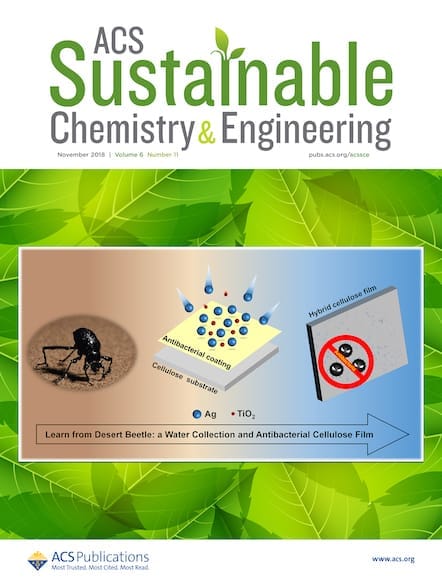The study of advanced porous materials (APMs), encompassing metal-organic frameworks (MOFs), covalent organic frameworks (COFs), porous organic polymers (POPs) and others, has progressed rapidly in the past few decades. On the applications front, APMs have the potential to redefine numerous domains related to energy and the environment. However, the synthesis of remarkably complex functional structures […]

The study of advanced porous materials (APMs), encompassing metal-organic frameworks (MOFs), covalent organic frameworks (COFs), porous organic polymers (POPs) and others, has progressed rapidly in the past few decades.
On the applications front, APMs have the potential to redefine numerous domains related to energy and the environment. However, the synthesis of remarkably complex functional structures requires potentially elaborate synthetic procedures deserving careful sustainability and life-cycle analyses.
In this Virtual Special Issue “Advanced Porous Materials: Design, Synthesis, and Applications in Sustainability” from ACS Sustainable Chemistry & Engineering, 34 articles, 2 letters, and 8 perspectives have been curated to offer a cradle-to-grave look at the applications and synthetic methods of APMs.
Advanced Porous Materials: Design, Synthesis, and Applications in Sustainability
Metal–Organic Framework (MOF)-Derived Effective Solid Catalysts for Valorization of Lignocellulosic Biomass

High Yield, Low-Waste Synthesis of a Family of Pyridyl and Imidazolyl-Substituted Schiff Base Linker Ligands

Development of Adsorbents for Selective Carbon Capture: Role of Homo- and Cross-Coupling in Conjugated Microporous Polymers and Their Carbonized Derivatives

Amine-Grafted MIL-101(Cr) via Double-Solvent Incorporation for Synergistic Enhancement of CO2 Uptake and Selectivity

Azo-Bridged Calix[4]resorcinarene-Based Porous Organic Frameworks with Highly Efficient Enrichment of Volatile Iodine

Screening and Design of Covalent Organic Framework Membranes for CO2/CH4 Separation

Water-Based Synthesis and Enhanced CO2 Capture Performance of Perfluorinated Cerium-Based Metal–Organic Frameworks with UiO-66 and MIL-140 Topology

Glycine-Modified HKUST-1 with Simultaneously Enhanced Moisture Stability and Improved Adsorption for Light Hydrocarbons Separation

Computational Design of 2D Covalent-Organic Framework Membranes for Organic Solvent Nanofiltration

Ionic Conduction in Metal–Organic Frameworks with Incorporated Ionic Liquids

Trace Carbon Dioxide Capture by Metal–Organic Frameworks

Nanoporous Polymer Microspheres with Nitrile and Amidoxime Functionalities for Gas Capture and Precious Metal Recovery from E-Waste

Low-Cost and High-Performance Microporous Metal–Organic Framework for Separation of Acetylene from Carbon Dioxide

Crystal Engineering of Metal–Organic Framework Thin Films for Gas Separations

Facile Fabrication of High Performance Nanofiltration Membranes by Using Molecular Coordination Complexes as Pore-Forming Agents

Energy Efficient Formaldehyde Synthesis by Direct Hydrogenation of Carbon Monoxide in Functionalized Metal–Organic Frameworks

Molecular Simulations of MOF Membranes and Performance Predictions of MOF/Polymer Mixed Matrix Membranes for CO2/CH4 Separations

Light-Harvesting in Porous Crystalline Compositions: Where We Stand toward Robust Metal–Organic Frameworks

Metal–Organic Framework Supported Single Site Chromium(III) Catalyst for Ethylene Oligomerization at Low Pressure and Temperature

Regulating C2H2 and CO2 Storage and Separation through Pore Environment Modification in a Microporous Ni-MOF

Room-Temperature Tandem Condensation-Hydrogenation Catalyzed by Porous C3N4 Nanosheet-Supported Pd Nanoparticles

Anion Pillared Metal–Organic Framework Embedded with Molecular Rotors for Size-Selective Capture of CO2 from CH4 and N2

Chemical Liquid Deposition Modified 4A Zeolite as a Size-Selective Adsorbent for Methane Upgrading, CO2 Capture and Air Separation

MIL-53(Al)/Carbon Films for CO2-Sensing at High Pressure

Porous Fe–N–C Catalysts for Rechargeable Zinc–Air Batteries from an Iron-Imidazolate Coordination Polymer

Scalable and Sustainable Synthesis of Advanced Porous Materials

Solvent-Free Crystallization of Zeolitic Imidazolate Framework Membrane via Layer-by-Layer Deposition

Conversion of Formic Acid into Methanol Using a Bipyridine-Functionalized Molecular Heterogeneous Catalyst

Synthetic Factors Affecting the Scalable Production of Zeolitic Imidazolate Frameworks

A High Proton Conductive Hydrogen-Sulfate Decorated Titanium Carboxylate Metal−Organic Framework

Vanadium Docked Covalent-Organic Frameworks: An Effective Heterogeneous Catalyst for Modified Mannich-Type Reaction

Tunability and Scalability of Single-Atom Catalysts Based on Carbon Nitride

Direct CO2 Capture from Air using Poly(ethylenimine)-Loaded Polymer/Silica Fiber Sorbents

Microporous Metal–Organic Framework with Dual Functionalities for Efficient Separation of Acetylene from Light Hydrocarbon Mixtures

Chiral DHIP- and Pyrrolidine-Based Covalent Organic Frameworks for Asymmetric Catalysis
Li+ Ion-Conducting Sulfonate-Based Neutral Metal–Organic Framework

OX-1 Metal–Organic Framework Nanosheets as Robust Hosts for Highly Active Catalytic Palladium Species

Luminescent Metal–Organic Framework for Lithium Harvesting Applications

Covalent and Selective Grafting of Polyethylene Glycol Brushes at the Surface of ZIF-8 for the Processing of Membranes for Pervaporation

Highly Selective Heterogeneous Ethylene Dimerization with a Scalable and Chemically Robust MOF Catalyst

Highly Defective UiO-66 Materials for the Adsorptive Removal of Perfluorooctanesulfonate

Advanced Porous Materials for Sensing, Capture and Detoxification of Organic Pollutants toward Water Remediation

Selective Aerobic Oxidation of Cumene to Cumene Hydroperoxide over Mono- and Bimetallic Trimesate Metal–Organic Frameworks Prepared by a Facile “Green” Aqueous Synthesis

Matching the Activity of Homogeneous Sulfonic Acids: The Fructose-to-HMF Conversion Catalyzed by Hierarchically Porous Sulfonic-Acid-Functionalized Porous Organic Polymer (POP) Catalysts

***
Toward Green Production of Water-Stable Metal–Organic Frameworks Based on High-Valence Metals with Low Toxicities
ACS Sustainable Chem. Eng., 2019, ASAP
DOI: 10.1021/acssuschemeng.9b01022
